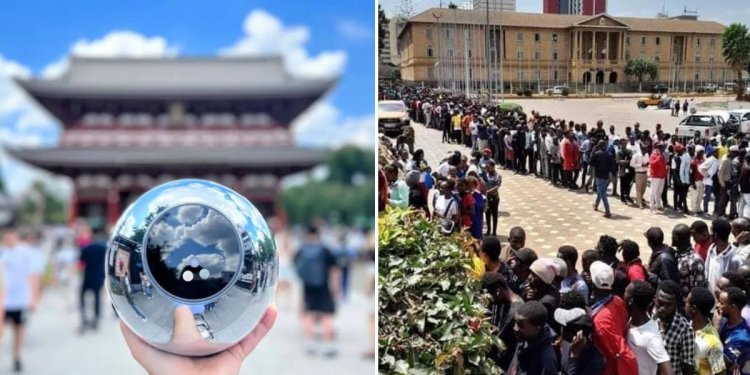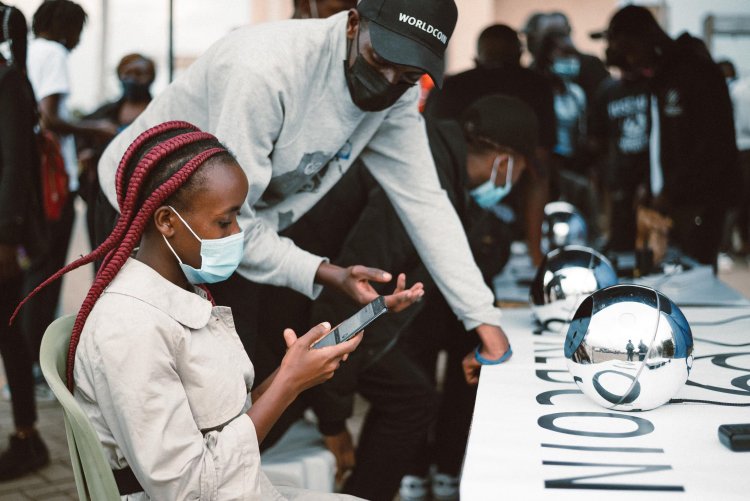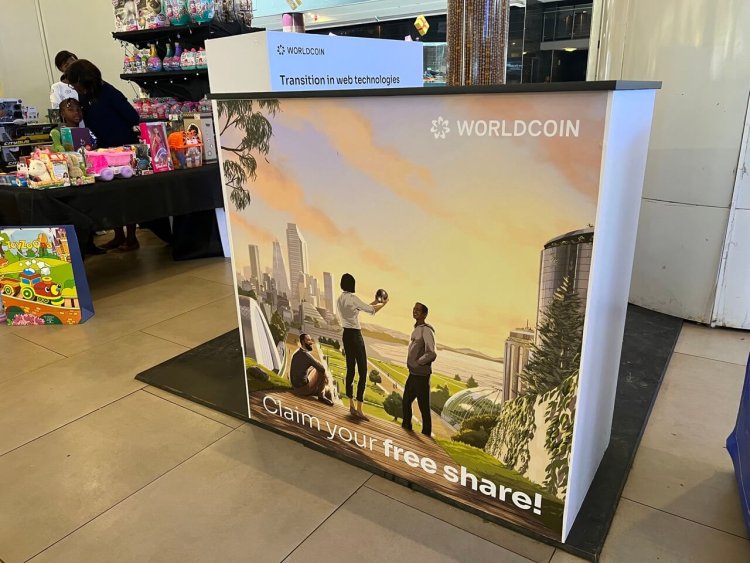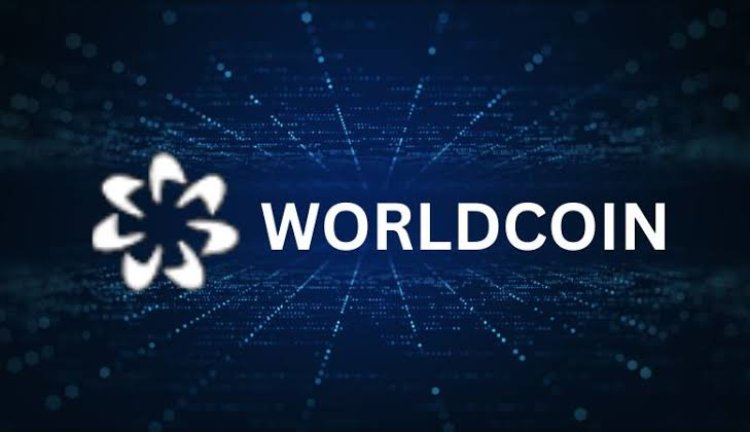Worldcoin Terms & Conditions Kenyans Missed In 10-Page Document
Before the government suspended the operations of Worldcoin in Kenya, over 350,000 Kenyans had their irises scanned while registering for Worldcoin, all of whom overlooked a 10-page document containing surprising terms and conditions

Kenyans have that unfettered tendency of skipping terms and conditions for anything, be it a product or service before purchase and use, and surprisingly continued in that spirit a week after the launch of the controversial cryptocurrency tech firm, Worldcoin.
Before the government suspended the operations of Worldcoin in Kenya, over 350,000 Kenyans had their irises scanned while registering for Worldcoin, all of whom overlooked a 10-page document containing surprising terms and conditions to prove that they are human beings during the chase for the precious Ksh7,700 token.
During the mass registration at KICC which saw thousands of Kenyans turn up, the extent of Worldcoin staff advice was just simple; download the app, sign up and get your iris scanned through the ball-shaped orb for money.
Coincidentally, this is an exercise Viral Tea also encountered when Worldcoin was carrying out its pre-registration outside a number of shopping malls in Nairobi sometime in late 2022 and the first half of 2023.

A Kenyan signs up for Worldcoin during a past activation. /WORLDCOIN
What Regulations Did Kenyans Miss?
During the registration, a lot of details were concealed including the fact that you cannot sue Worldcoin in a court of law or seek compensation.
“You agree to resolve any disputes between you and Worldcoin through binding arbitration rather than in court,” the terms read in part, adding that the Worldcoin tokens accrued do not amount to a piece of investment advice, nor can they be guaranteed to appreciate, hence the possibility to have zero value.
The terms go on to state that there is no guarantee that the platform would be launched worldwide, and does not even guarantee its operation after all, as it is an open-source software, which ‘anyone can copy, paste and use’.
“The software used to create WLD is open-source and free for anyone to copy and use. This means that anyone can create a modified version of WLD, otherwise known as a “Fork.” We are not responsible for any losses you incur which are caused in whole or in part by a Fork or other network disruption,” the skipped terms further add and with the registration, thousands of Kenyans could be exposed to unspecified consequences.
Worldcoin's parent company had already indicated that it intended to, through users, access third-party address book contacts, raising initial security concerns.
While it cautions users against providing any data, it later specifies that they are required to provide some data so as to use specific features. In earnest, users were asked to provide names, email addresses, phone numbers (which then scan contact lists), and their location details.
“The type of location data collected depends on the service you are using, the device you're using (for example, Apple or Android), and your device's settings (whether permissions are enabled or disabled). You can change your permissions any time in your device's settings,” the document on the Worldcoin website reads in part.
Further, the terms and conditions state that there will be no refund or compensation in the event of digital tokens being stolen by “hackers or other malicious groups”, or if there is an “intentional or unintentional bug” on the open-source software they use.
Worldcoin's Argument
Worldcoin says it does not fetch personal data from users when they download the World App – personal data, in this case, being name, phone number and address.
“Individuals who want to receive a World ID are not required to share their name, phone number, email address, or home address. Images collected by the Orb are used to generate a unique iris code,” says the company.
It adds that the images are “by default” immediately deleted once the iris code is created unless the user opts into Data Custody, in which case the probability and frequency of the user’s need to reverify their World ID decreases as the iris code algorithms change.

A Worldcoin desk during a past activation. /FILE
“The World ID sign-up process is only intended to verify an individual’s uniqueness - i.e., that they have not previously signed up and received a World ID,” adds Worldcoin.
Users may choose to share additional data, but the company says it is not a requirement. This includes an email address to sign up for the Worldcoin newsletter.
The project goes on to state that any personal data shared with them is encrypted “in transit and at rest.”
“The Worldcoin Foundation and its contributor Tools for Humanity do not and never will share any personal data (including biometric data) with anyone who is not working on or assisting with the Worldcoin project,” it says, adding that this also applies to selling data.
Additionally, Worldcoin says it never collects any biometric data from any user without that user’s explicit consent, something ICT Cabinet Secretary (CS) Eliud Owalo alluded to when asked about the legality of the company’s operations in Kenya on Wednesday, August 2.
“Information available to the Data Commissioner is that within the existing legal frameworks is that there is no provision in the law that the organisation has breached. There has been correspondence with them,” Owalo told NTV, adding that Worldcoin's argument was that they were getting their data voluntarily from Kenyans.
What Does the Data Protection Act Say?
The Data Protection Act stipulates that a data subject has a right to be informed of the use to which their personal data is to be put; to access their personal data in the custody of a data controller or data processor, and to object to the processing of all or part of their personal data.
Additionally, a data controller or data processor shall collect personal data directly from the data subject, or indirectly where the data is contained in a public record and the data subject has deliberately made the data public.
Kenya Complaints On Worldcoin
In the wake of the suspension despite CS Owalo revealing that the government was yet to crack down on and shut down the international company as it had not broken any laws, the Ezra Chiloba-led Communications Authority of Kenya (CA), the Data Protection Commissioner, and the Capital Markets Authority (CMA) all raised regulatory issues with the operations of Worldcoin.
"Since the launch of WorldCoin operations in Kenya, the Communications Authority of Kenya (CA) and the Office of the Data Protection Commissioner (ODPC) has undertaken a preliminary review and noted a number of legitimate regulatory concerns that require urgent attention," stated Chiloba in part.
Among the issues the CA and OPDC raised included the lack of clarity on the security and storage of the collected sensitive data (facial recognition and iris scans). The authority further argued that obtaining consumer (data subject) consent in exchange for monetary reward borders on inducement.
While Worldcoin contemplates that the accrued tokens do not amount to legal tender, CMA on its part reiterated that the coins touted could be potential fraudulent schemes involving cryptocurrencies in the backdrop of the fallout from the rollout of Worldcoin.
CMA warns that Worldcoin is not regulated in Kenya and that related products including the free crypto-tokens and their derivatives are not investment products within the scope of the Capital Markets Act.
Worldcoin Reacts To Kenya Suspension
Since then, Worldcoin co-founder Alex Blania reacted to the suspension of its operations in Kenya by claiming that the company's operations are above board and that World ID, which they are creating, is a safe and secure method to protect data.
"Tools for Humanity (TFH) has paused World ID verifications in Kenya as we continue to work with local regulators to address their questions. We apologise to everyone in Kenya for the delay," he stated.
"World ID is built for privacy. We look forward to resuming operations while continuing global rollout."
The tech firm is building a global identification system using iris scans which can prove a person's uniqueness or prove whether a subject is human.
WorldCoin argues that in a world where Artificial Intelligence (AI) is fully functional, it can be hard to determine whether an agent is human or a machine. They believe that technology will solve the problem.
However, the company's conduct in collecting biometric data from across the world has attracted criticism and investigations from data protection regulators, with investigators citing some of the techniques being used by the firm in developing countries as exploitative.
In Kenya for instance, the company has been collecting data in exchange for crypto tokens equivalent to close to Ksh8,000.
Another place the project has raised eyebrows over data security is Europe, where for European Union (EU) member states, the General Data Protection Regulation (GDPR) regulations are known to clamp down on tech giants.
Earlier this week, the United Kingdom’s Information Commission Office said it would be “making enquiries” about Worldcoin, while France's privacy watchdog CNIL said the legality of the project’s biometric data collection "seems questionable".
What Is Worldcoin Trying To Do?

Worldcoin's logo. /FILE

 admin
admin 




